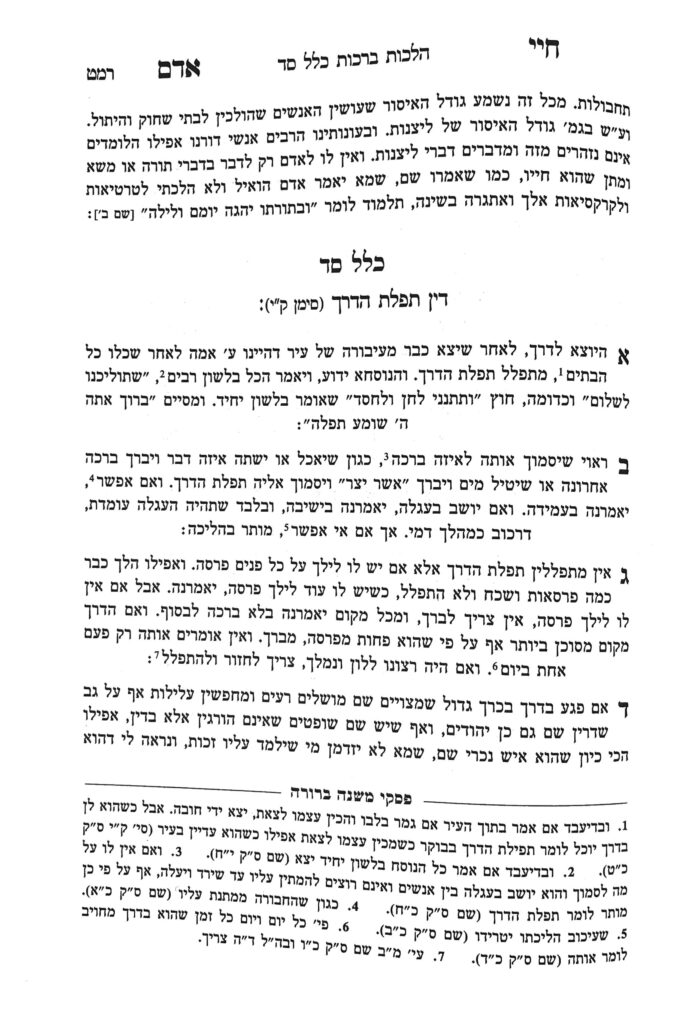1We are beginning siman 4. The Chayei Adam discusses a halacha sourced in the Gemara and brought in the Shulchan Aruch but not commonly practiced. We will learn the Aruch Hashulchan’s explanation as to why it is no longer commonly practiced. From the fact that the Chayei Adam mentions it, it appears he held it should still be practiced.
The Chayei Adam writes that certain large cities were known for forcing travelers to pay money, threaten their lives, or commit other evil actions against travelers. If a person is traveling and passes through one of these cities, even if there are Jewish people there, they are considered to be in danger. If the courts decide, for whatever reason, to jail or try the visitor, it is unlikely that they will be given a good defense, and, even if there are Jewish people in the city, they may not be aware of the traveler’s predicament. Additionally, one may incur a financial loss.
Therefore, the Chayei Adam writes that before entering the city, one should recite יהי רצון מלפניך ה’ אלהי שתכניסני לכרך זה לשלום. Even entering the city can be dangerous, as taxes or other border-related issues may arise, so one recites this tefillah before entering.
Once a person has successfully entered the city, they thank Hashem for allowing them to enter uneventfully, reciting מודה אני לפניך ה’ אלהי שהכנסתני לכרך זה לשלום.
When a person is ready to leave the city, they should recite יהי רצון מלפניך ה’ אלהי שתוציאני מכרך זה לשלום to be successful in leaving the city without issue.
Once a person has successfully left the city, they thank Hashem for allowing them to leave peacefully, reciting מודה אני לפניך ה’ אלהי שהוצאתני מכרך זה לשלום. If one wishes, they may recite the beginning part of tefillas haderech (until v’sishlach bracha etc.), even if they will not travel the requisite distance necessary to be obligated in it. The Rambam appears to tie the two together, and holds that one would recite a full tefillas haderech at this point, even if they were not traveling the requisite distance normally necessary, however we do not pasken like the Rambam.
If a person is not planning to pause while they are within the city, they only recite two bakashos. Before they enter, they recite יהר”מ ה’ אלהי שתכניסני ותוציאני מכרך זה לשלום. After they leave, they recite מודה אני לפניך ה’ אלהי שהכנסתני והוצאתני מכרך זה לשלום.
The poskim discuss why we no longer recite these bakashos. The accepted explanation is that our cities are no longer as dangerous as they were previously. However, it does not explain current travel dangers, such as car accidents and so on. Therefore, the poskim assume that one may recite these bakashos nowadays if they wish to do so. Since there is no bracha at the end, a person may recite a tefilla or bakasha whenever they wish.
The Aruch Hashulchan paskens that one should still recite this tefilla nowadays, even if the dangers we face are not identical to the dangers which existed when the bakashos were first instituted.
Summary
The Gemara, Shulchan Aruch and Chayei Adam bring down bakashos that one should recite when traveling through a dangerous city. Although the minhag has become to refrain from these bakashos, if one wishes to recite them, they are encouraged to do so.



